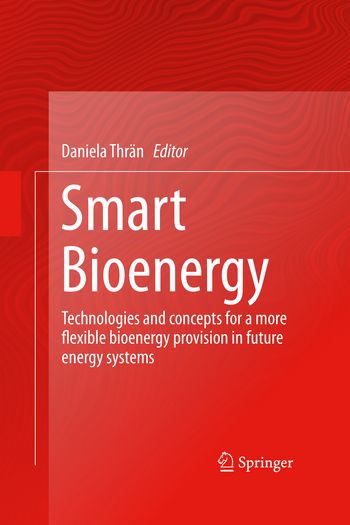DBFZ scientists publish research strategy for "smart" bioenergy provision
The transition of the energy system towards a renewable resource base requires a rethinking in all energy sectors and also the further development of bioenergy provision to better complement wind and solar energy. The now published research strategy involving different DBFZ scientist is entitled "Smart Bioenergy - Technologies and concepts for a more flexible bioenergy commission in Future Energy Systems" provides the latest research findings and perspectives in the field of energy and integrated material biomass use.
With its various applications (electricity, heat, fuels) biomass is not only the oldest, but also one of the most versatile energy carrier among the renewable energies. In addition, it also provides raw materials for the chemical industry and contributes significantly to integrated material utilization in a bio-based economy. With its wide range of already established, as well as in research, technical methods for energy it is an essential part in the development of a sustainable energy future. Nevertheless, there is need for further development. In addition to challenges with regard to a sustainable biomass deployment, it will be significantly more important in the future to use biomass in the fields, in which other renewable alternatives are not or only partially available. Such integration of bioenergy into existing and future energy systems requires extensive technological development of biomass energy use, both in the electricity, as well as heat and fuel sectors. "Smart" bioenergy provision describes the transition from today continuously operated bioenergy plants in flexible systems that always be used when, for example, there is no sun and no wind.
"The smart bioenergy use in small, very precisely controlled plants will be a building block of integrated supply systems and be able to contribute to the sustainable energy supply of tomorrow. The purpose of this book is not only the essential areas of work DBFZ represented biomass use in the field of energy and integrated material, but also the objectives, challenges and technological approaches of the future energy system described and concrete perspectives presented from a scientific perspective", stresses the editor Prof. Dr. Daniela Thrän from the DBFZ, Helmholtz Centre for Environmental Research (UFZ) and the University of Leipzig.
In a total of eight chapters recapitulating and analyzed the book "Smart Bioenergy" around ten years of work by Germany to the political conditions for the conversion of a system based on renewable energy power system. The authors begin with a comprehensive view of market and resource base, and then analyze the technical possibilities for a more integrated use of bioenergy. The analysis encompasses the entire bioenergy supply chain, including solid, liquid and gaseous fuels. A practical example demonstrates the detailed effects of intelligent bioenergy on the German energy system. The book concludes with a look at the most promising areas of biomass energy supply and a professional assessment of the conditions required for this purpose.
The book "Smart Bioenergy - Technologies and concepts for a more flexible bioenergy commission in Future Energy Systems" is published by Springer-Verlag and can be obtained as e-book or hardcover (ISBN: 978-3-319-16192-1).

Smart Bioenergy – innovations for a sustainable future
The DBFZ works as a central and independent thinker in the field of energy and material use of biomass on the question of how the limited available biomass resources can contribute to the existing and future energy system with sustainability and high efficiency. As part of the research the DBFZ identifies, develops, accompanies, evaluates and demonstrates the most promising fields of application for bioenergy and the especially positively outstanding examples together with partners from research, industry and public. With the scientific work of the DBFZ, the knowledge of the possibilities and limitations of energy and integrated material use of renewable raw materials in a biobased economy as a whole should be expanded and the outstanding position of the industrial location Germany in this sector permanently secured – www.dbfz.de/en.
